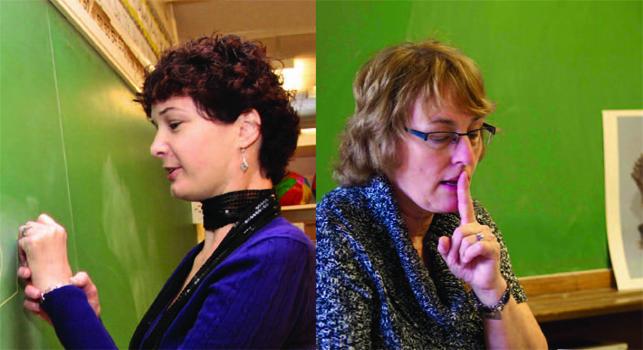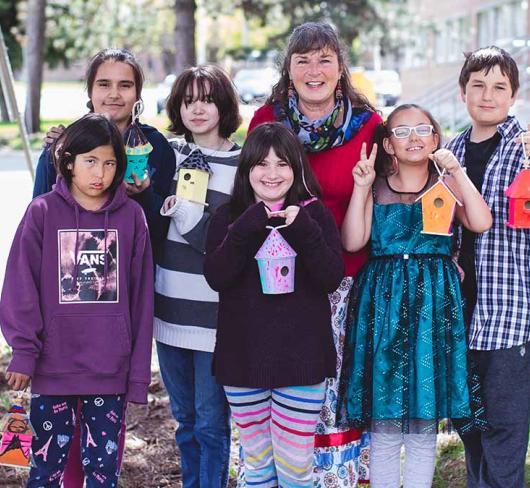
Disabled or Enabled? Turning Challenges into an Asset
Cheryl MacMillan
When Cheryl MacMillan was 11 years old she and her family discovered she was deaf. The revelation changed her life — not for the better.
“I was playing with a group of kids at the end of the street,” MacMillan explains. “My mother called me. All the kids turned to look at her, except me. That’s when it hit her.”
MacMillan’s hearing loss had not been obvious because, she says, “I had adapted so well: I read lips and body language.” Her family was used to the unusual way she spoke. (She subsequently spent a year with a speech therapist who taught her the mechanics of pronunciation.) She adds: “If you can’t hear you don’t know what you are missing. I sometimes wondered, but not enough to realize something was wrong.” MacMillan had been an accepted part of the group in her Port Colborne neighbourhood and at her school. “Until then nobody harassed me, but then I got that awful hearing aid. Suddenly I was a freak and I endured much bullying – some of it by the same kids who had accepted me before.”
The discrimination was not confined to childhood or to children. Today MacMillan teaches music at McKay Public School in her home town, Port Colborne. She has nothing but praise for her current principal. But she says, she has had colleagues “who ridiculed me” and “ignorant principals” who made negative comments. As she speaks MacMillan counts them off on her fingers. She says at least six out of 14 principals she has dealt or worked with have made negative comments, such as “I can’t have you at my school; you can’t even hear.”
This prejudice has been hurtful, despite a life of accomplishment and success. MacMillan has always been musical.
As a teenager she was so determined to learn to play the piano that she made an agreement with her parents: they would let her take piano lessons if she also continued with the violin. At 18 she won an Ontario-wide violin competition. She turned to teaching after having run her own music studio for many years.
The gift of silence
MacMillan’s first full-time teaching job was as a special education teacher but, she says, “When they found out I had music they made me the music teacher.” MacMillan’s hearing loss – the result of an antibiotic she was given as a newborn – is not total. She can hear sounds, but has difficulty distinguishing words and nuances. As a child she never heard a bird sing, but today intense concentration plus the help of more advanced hearing aids enable her to work with the school choir, which has a long history of success in local festivals.
She believes her disability has given her a gift—the gift of silence and of taking time and paying attention. These are strategies she uses in the classroom. “I had grade 2s who were drawing lollipop trees, sticks with balloons,” she says by way of example. “I took them outside and taught them how to pay attention and take time. They came back with the most wonderful drawings of trees.” Similarly, she takes the time to help students find their singing voice. There is no one who can’t sing, she says.
MacMillan is up-front about her disability with her students. She asks them to be her ears when announcements come over the PA system. Kids accept her totally, she says. And she emphasizes that “I have never been harassed at this school.” Her principal even changed the fire alarm signal to accommodate her.
Becoming an activist
But harassment in previous positions led MacMillan to take action. At the ETFO annual meeting in 2000 MacMillan brought forward a motion to establish a Disabilities Issues Committee. “I stood up and told my story,” she recalls. Delegates voted overwhelmingly to set up the committee.
At this year’s annual meeting MacMillan thanked speakers for standing to the side of the microphones so that those watching the overhead screens could read their lips. She continues to act as an advocate for colleagues with disabilities.
One member who asked for help was a teacher who had suffered from polio as a child and had one leg that was shorter than the other. Her principal assigned her to a kindergarten class. Getting down to the children’s level was a constant challenge. She was close to tears when she asked for help, MacMillan said. The solution – a wheeled chair that allowed her to navigate her classroom easily. The bill for the chair was presented to the principal.
“Boards spend money to accommodate children with special needs,” MacMillan points out. “They also have a responsibility to accommodate teachers.” She is proud of having been a driving force behind the Disabilities Issues Committee. And she is proud of her federation. “ETFO is a leader in equity and social justice. Other organizations look to ETFO and adapt what ETFO does. There is more accommodation and acceptance of diversity now because of ETFO.”
MacMillan says she has never let her disability stand in her way. All her life she has been involved in community organizations, music groups, and clubs. “That’s my way of giving back,” she says. During MacMillan’s break, two former students come into her classroom to ask her to sign a form. “She’s an awesome, wicked teacher,” says a 16-year-old wearing his baseball cap backwards. “I loved being in her class and I come
back whenever I can.”
Kari Buie
In Sault Ste. Marie Kari Buie is also working in a teaching position that challenges her physically. Buie is an insulin-dependent diabetic and she has a rare neuromotor disease that affects the dexterity and strength in her hands, and the strength and range of motion in both arms. Cold weather makes her condition worse. She cannot raise her arms above her head, and in the cold, can’t hold a pen. Her left arm is particularly affected.
The disease (monomelic amyotrophy) set in when she was about 19 and got progressively worse until it stabilized seven years later. To deal with it, the left-handed Buie taught herself to write with her right hand on the chalkboard. As a classroom teacher she has difficulty writing above her head on the board; she often uses her right arm to support her left. There are also challenges getting dressed because, for example, she cannot touch her abdomen with her left hand. Putting on boots and coats, tying shoelaces– these everyday actions all pose challenges and take much longer.
Nevertheless, after eight years as a classroom teacher Buie agreed to take a position as an itinerant specialist travelling to three different schools. She teaches physical education, visual arts, music, drama, and dance to students from Primary to Intermediate. Demonstrating what she wants students to do is a challenge. “I get kids to listen a lot more; I tell them to do as I say not as I do.” Or she will ask students to demonstrate and finds that “kids are really good about that.”
A better teacher
Buie, who “looks normal outwardly,” explains her disabilities to every new group of students. She lets her students ask questions and finds them accepting. Some will ask privately how she manages with everyday tasks. She explains the contortions required to put on a sweater or pull up a zipper.
Her disability is an asset, Buie says. “It makes me a better teacher. I am able to convey to my students that everybody needs help at some time. It helps them to understand it’s okay to ask for help.”
She adds: “I’ve become an excellent problem solver. I focus on what it is that I can do, not what I can’t do.” She models this attitude for her students with special needs. “We work on the idea of doing what you can do with what you have. My disabilities help me understand when they have difficulties and frustrations,” and they give her credibility when she explains to students that “there are ways to overcome our challenges. We need to sometimes take a moment to breathe and think through the situation and overcome the challenge.”
Asserting her rights
Buie says principals and colleagues have been understanding and supportive. When outdoor supervision in cold weather became a hardship, her principal arranged for her to supervise inside. When she needed a parking spot close to the school entrance to minimize her time outside and to make it easier to carry things in, she asked for and received a disabled parking spot—which, she points out, should already have been in place.
Buie has taken quiet but decisive action to assert her rights. She left a board-mandated PLC to take her scheduled preparation time. “I was the first person to take preparation time during a PLC. I took it because I could do the reading activity on my own time, and I needed to prepare for a replacement,” she explained. “It takes me longer than other people to put together materials. I was entitled to my prep time, but I also physically needed the time to get things done.” She was questioned by administration, and she wonders if the superintendent would have been as understanding if she had not had a disability.
With three schools to travel to, Buie knew she would have problems meeting her schedule during cold weather. “The transition time was barely enough during the warm fall. In winter I am affected more and it takes more time to get on my coat and boots. I was faced with asking all the principals and the superintendent to give me more time. I reworked my schedule and they approved it within days.
“Maybe they’ll start understanding that the transition time is also not enough for people without disabilities. I hope others will start to stand up for more travel time.”
Buie was a participant in Leaders for Tomorrow, where she learned that if she wanted to have administration solve a problem it was best to go with a solution in hand. She has been a school steward most years and has chaired her local’s professional learning committee. As a unit representative for the local, she is the first point of contact for stewards from six schools. Last year she presented her first Access Without Borders workshop to occasional teachers in Halton.

